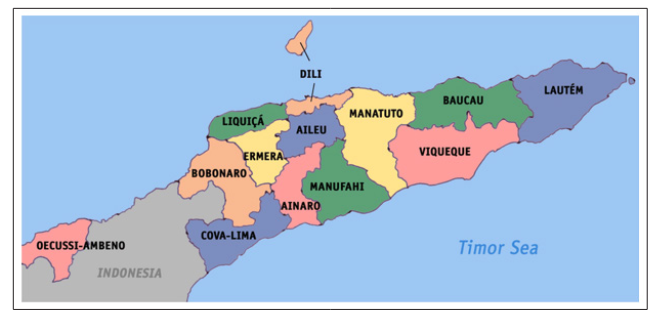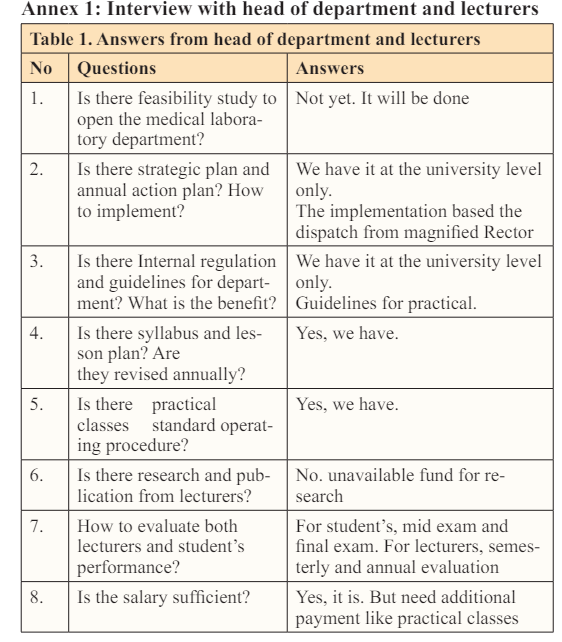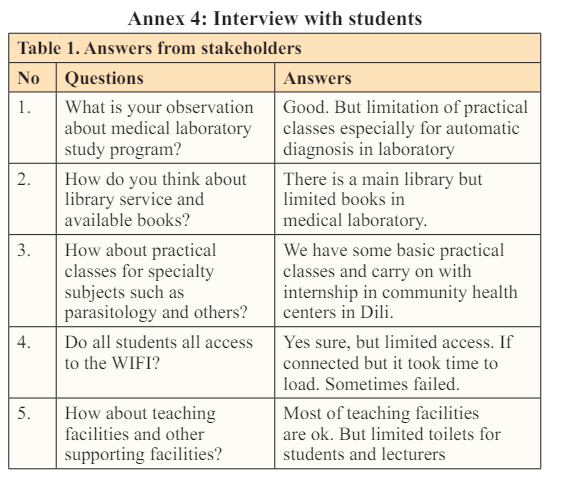Author(s): Gregorio Rangel*, Paulino Saldanha, and Edmundo Viegas
Introduction: Accreditation for higher education in Timor-Leste leaded and realized by National Agency for Academic Assessment and Accreditation (NAAAA), Ministry of Higher Education, Science and Culture. In medical education, accreditation aim to assess the availability of curriculum, human resources, infrastructure and medical laboratory equipment to support teaching and learning process in the academic higher institution especially for the medical laboratory sciences education. This accreditation was conducted in Oriental University of Timor-Loro Sa’e (UNITAL) especially department of medical laboratory technology. The 39 respondents were 10 lecturers, 4 stakeholders, 13 alumni and 12 students from department of medical laboratory. It was found that there were very limited human resources with expertise that compatible to the study program, curriculum issue, limited room for teaching and learning process, limited WIFI accession, and require a complete laboratory equipment for practical classes. However, the department has been established more than 6 -7 years without curriculum revision, laboratory infrastructure progress and compatible lecturers that available.
Timor-Leste is one of the newest countries which is located in southeast Asian nation. The country occupying the half of island of Timor with total population 1.340,434 In 2022 Administratively, the country consists of 1 special autonomous region of Oecussi, 13 municipalities, 65 post administrative, 442 villages and 2.225 hamlets [1]. Throughout these municipalities, Baucau has one higher education institution in teacher training, Dili Institute of Technology (DIT) has one branch in Oecussi, Cristal Institute branch in Baucau and Manufahi, Institute of Business (IOB) has also one branch in Maliana. The Manufahi municipality has two higher education such as Betano Polytechnics Institute (IPB) and Institute Boa Ventura Timor-Leste (IBTL).
Higher education institutions in Timor-Leste totally is twenty-two (22). They are Universidade Nacional Timor-Loro Sa’e (UNTL), Universidade da Paz (UNPAZ), Universidade Dili (UNDIL), Universidade Oriental Timor Loro Sa’e (UNITAL), João Saldanha University (JSU), Institute of Business (IOB), Dili Institute of Technology (DIT), Institute Superior Cristal (ISC). Instituto Ciéncias da Saúde (ICS), Instituto São João Brito (ISJB), (IPDC), (ISFIT), (IFFS), Betano Polytechnics Institute (IPB), ICFP, IBTL, Universidade Catolica Timorese (UCT).
Timor-Leste one of the youngest populations in the Asia and pacific region, with a median age 20 years. The majority of people are catholic religion. Official language is Tetum and Portuguese. English and Indonesian languages are working languages for Timor-Leste. And around 32 dialects in Timor-Leste.

Figure 1: Map of Timor-Leste
The people of Timor-Leste have constitutional right to education according to article 59 of the constitution. Education system in TimorLeste has a network of 22 higher education institution with National Agency for Academic Assessment and Accreditation (NAAAA) for accreditation and assessment. To guarantee the education system in Timor-Leste, NAAAA has been realized accreditation program in all higher education institution in Timor-Leste so far
Accreditation is an important step to create a set of quality standard for all academic institution or study program. In this case accreditation and assessment are realized to know how the institution or department operate and relate [2]. There are two accreditation programs. They are institutional and programmatic accreditations. The accreditation and assessment program in Timor-Leste have been realized since 2010 up to now.
In 2022, total higher academic institution that passed from institutional accreditation such as UNTL, UNPAZ, UNDIL, DIT, IOB. Those higher academic institution that passed from programmatic study consist of UNTL with study program of Medicine, Nurse, Midwife, etc.
Medical laboratory science education in Timor-Leste in several higher education such as UNTL, UNITAL and ICS Dili. Apart from these higher education institutions, medical laboratory of UNITAL will be described in this work. Monitoring and supervision are an important program that need to do by NAAAA to check the higher education system during teaching and learning processes. However, accreditation program is an activity which include international and national assessors and NAAAA representatives during the assessment process to investigate and describe the current status of quality regulation and accreditation standard [3].
Medical laboratory department have to be equipped with laboratory instrument, reagents and consumables to facilitate better for practical classes before students going to implement the knowledge and science that have been gained during teaching and learning process at campus to the health facilities in the country during on job training. To guarantee the capacity of students in medical laboratory, lecturers have to hold a minimum degree of bachelor honor in medical laboratory, practical laboratory, internship and research . To realize an accreditation from NAAAA to all higher education.
institutions in Timor-Leste especially medical laboratory education to find out it’s challenges and progress that each higher academic institution has. To achieve the objective of the accreditation, assessors were interview lecturers, stakeholders, alumni and students. The interview realized to know the hiding challenges that have by both lecturers and students in the teaching and learning process [4].
The qualitative and quantitative assessment templates were used during the accreditation process to collect information through lecturers, stakeholders, alumni and students. Meanwhile the selfassessment report (SAR) and matrix assessments also were used as an instrument during the accreditation process. All data were confirmed based on SAR, visited laboratory practical classes, library, clinical pharmacy and radio station. The SAR and matrix assessments were used to confirm and interview lecturers and students during the accreditation processes [5].
The accreditation had been carried out in September 2022. There were 39 people who involved in the accreditation and assessment program especially medical laboratory department. Two days accreditation process in UNTAL. Day one, assessors were welcomed by vice rector for academic. After welcoming session, assessors (international and national) were carry on assessment with dean of faculty, head of department of medical laboratory, internal quality assurance for laboratory, permanent and part-time lecturers. Day two, assessors were visited library, laboratory practical rooms, teaching and learning rooms and radio station. Interview with lecturers and identification problems based on
The assessment was identified that the curriculum consists of foundation courses, professional courses, specialization courses and institutional courses. The content of curriculum needs to revised because bachelor degree may have only molecular biology subject rather than molecular biology 1 and 2 for bachelor study program [6].
Assessors were identified that permanent lecturers who are compatible with study program totally seven (7). However, only two (2) lecturers were fulfill the criteria as bachelor honor in medical laboratory graduates even they are still working for the government institution. Limitation of medical laboratory equipment, reagents and consumables for practical classes, limitation of access to wireless fidelity for both students and lecturers, unavailable research fund for lecturers which showed that all lecturers without any publication in national or international journals in health, limitation of books in medical laboratory, limited toilet for both students and lecturers, limitation of standard operating procedures for laboratory practical classes.
In term of science, medical laboratory students from UNITAL when they took on job training at National Hospital Guido Valadares, Community Health Centers (CHC) and National Blood Bank. They had to take pretest, mid test and posttest for all subjects in the medical laboratory. Most of students achieve 85% during the pretest and posttest were realized. All students were active in laboratory clinical services. At the end of the on-job training, most of students were able and work independently by themselves [7].
The issue that found during the interview process with stakeholders indicated that limited patients for direct sample collection and observation under microscopy to recognize the diseases and improve the capacity of diagnosis in histology cells and some abnormal cells which unable to cover by CHC and blood bank.
The 13 alumni were selected and participated in the interview with national and international assessors. They were work in different private clinics previously. However, when corona virus diseases 2019 (COVID-19) entered Timor-Leste, government was recruit them to work in government institutions such as national health laboratory (NHL), national hospital Guido Valadares (HNGV) and other CHCs in Dili.
During the interview, assessors found several issues that argued from alumni such as: need to revise curriculum, upgrading study program from bachelor to the bachelor honor, improve practical classes, improve library needs for both students and lecturers, recruit more lecturers who are compatible with study programs, research and development need to realize soon in UNITAL especially medical laboratory department.
The 12 students were selected and represented from medical laboratory department UNITAL to participate in the accreditation process. The six (6) students were from sixth semesters, four (4) students were from forth semesters and two (2) from second semesters. Most of students were argued related limited facilities such as WIFI, toilets, laboratory instrument for practical classes and available books.
The issues that found such as limited WIFI during the teaching and learning process and other practical class need. Three (3) available toilets for both students and lecturers. Minimum laboratory instrument to increase student’s knowledge in term of practical classes and diagnostic skill. Three limited toilets that available for 1.350 students of UNITAL and 131 permanent lecturers. Limited available book in medical laboratory and practical laboratory instrument to enable and increase student’s knowledge and skills.
The assessors were visited laboratory practical classes, library, information technology room and radio station which facilitated more information to student’s, lecturers and community who access to UNITAL’s radio. There is a quite big room for practical classes which cover all laboratory practical parameters. Available various medical book in laboratory to facilitate both student’s and lecturers. There are various desktops available in the information technology room to be used for teaching and learning process.
The problems that found during the assessment process were limited medical laboratory instrument, reagents and consumables for practical classes, insufficient medical laboratory books available as references to be used to teach and research needs. These all issues were identified during the site visit.
According to the findings from acquire application documents from UNITAL, interview and site visit results indicated that fulltime lecturers who are compatible with study program with total seven (7) lecturers. These seven lecturers were majority are out of professional background. There are two (2) lecturers compatible to the study program. These two lecturers were graduate as bachelor honor in medical laboratory even still working for government institutions. However, five (5) other lecturers majority holding bachelor degree in other study program and still lecturing student’s medical laboratory. Therefore, it is necessary to recruit more medical laboratory graduates to be placed in the department of medical laboratory UNITAL [8].
After assessors did the site visit, identify limited instrument, reagents, consumables and durables to be used by both lecturers and students for practical classes. Available basic practical classes for malaria, tuberculosis, urine and many others. The students need more practical classes like parasitology which all cover helminthology, protozoology and entomology. On one hand, students are also having the right to do practical in bacteriology such as bacteriology in blood, urine, cerebrospinal fluids and also bacteria in food and water. On the other hand, students be entitling to all practical classes which related all specialty subjects that stated in the curriculum. Therefore, it requires more annual budget allocation for medical laboratory department to increase laboratory practical classes.
The WIFI is an important instrument during teaching and learning process in any higher or academic institution. However, lecturers and student have experienced limited WIFI access during teaching and learning process. Therefore, it needs to increase more bandwidth internet to be accessed by all lecturers, students and administration staffs for administration needs, teaching and learning process in UNITAL.
Based on result obtained from interviews during accreditation process, unavailable research fund for lecturers at the department of medical laboratory has been indicated without any scientific product or any research and publication in national or international journals. Therefore, it desires fund allocation for medical laboratory department to conduct research in the future to improve knowledge, skill and research ability [9].
Accreditation is an important process to evaluate and assess all requirements to meet the quality standards. In medical laboratory, accreditation and assessment aim to find out the quality medical laboratory graduates because the quality of graduates will determine the effectiveness of laboratory diagnosis. Based on the data found, firstly, the limited human resources which compatible to study program automatically affected teaching and learning process, either theory or practical. In some cases, there is no any master graduates or laboratory specialist can contribute to the teaching and learning process to enrich student’s knowledge and laboratory skill.
Secondly, insufficient the availability of laboratory instrument, reagents, consumables and durables for laboratory practical classes which affected practical class schedule and direct practice at campus after theory classes. Therefore, it requires allocation budget to improve laboratory practical classes in the future.
Thirdly, limitation of WIFI typically caused both lecturers and students unable to access online books, journals and other scientific product which available in internet. Internet is an important instrument for learners and lecturers to get more references and scientific information to improve knowledge and skills. Therefore, it needs to increase more internet’s bandwidth to cover all campus communities to access internet freely and easily
Fourthly, unavailable research fund for the medical laboratory department directly affected lecturers to improve knowledge and skill of laboratory for research and development. Pure or experimental research normally started from medical laboratory. Therefore, it needs annual allocation budget for medical laboratory department to start research and publication in both national and international journals.
Finally, the fourth issues are raised totally important things need to pay attention and solve. On the other hand, to improve the quality of the department in the future with aims to produce qualified graduates with competent of research and development.





